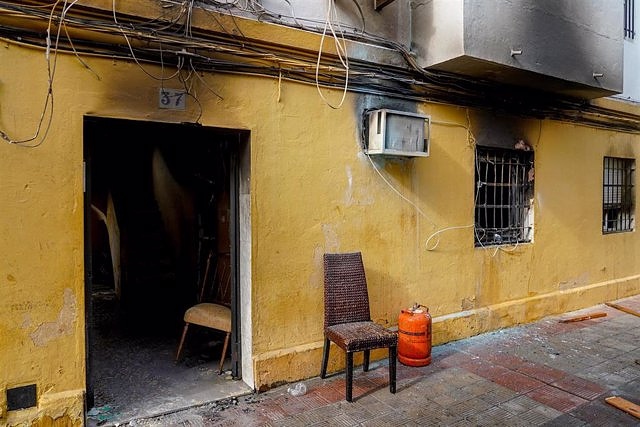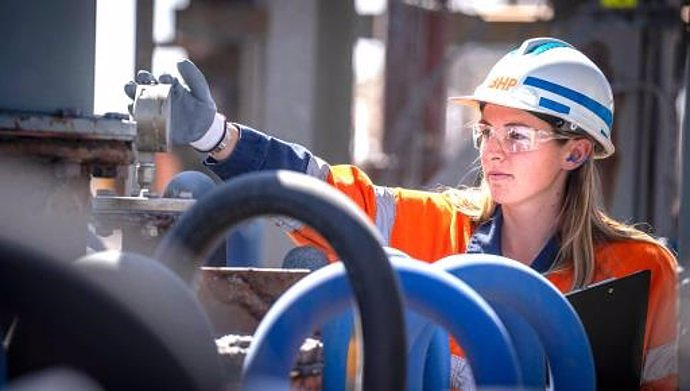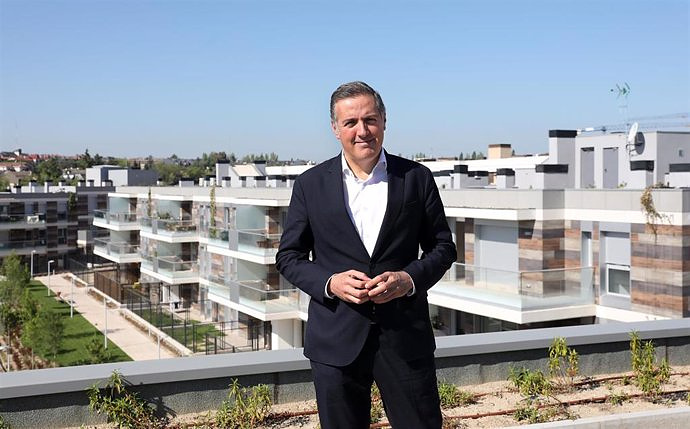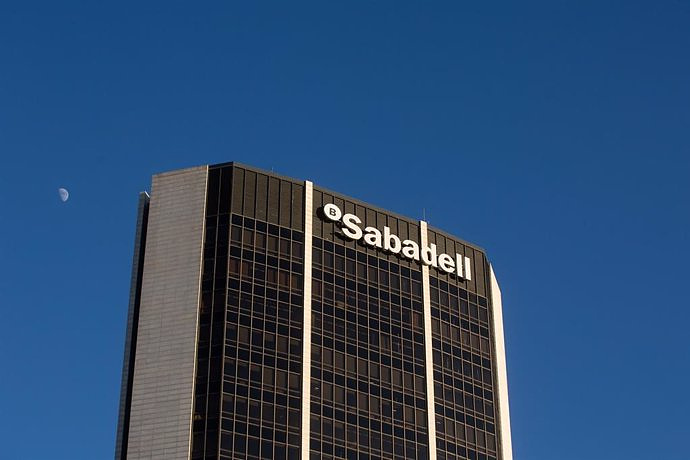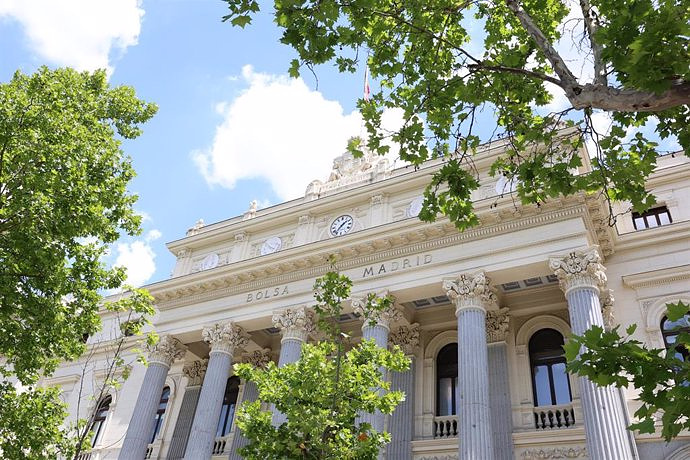He does not agree to apply the "complete defense of mental disorder" claimed by one of them
SEVILLA, 4 Ene. (EUROPA PRESS) -
The Supreme Court has resolved not to admit the appeal filed by one of the two brothers convicted of having set fire to the apartment they lived in in the Santa Aurelia neighborhood in October 2018 and attacking the police officers deployed to attend to the emergency; against the sentence of the Superior Court of Justice of Andalusia (TSJA) that confirmed his sentences of five years and two months in prison and two years and two months in prison, imposed by the Seventh Section of the Court of Seville.
This is how it appears in an order issued on December 1 by the Criminal Chamber of the Supreme Court and collected by Europa Press, against said appeal in which the convicted person argued that "his right to effective judicial protection had been violated, to the not having appreciated a complete defense of mental disorder".
In this regard, the Supreme Court states that in its initial conviction, the Court of Seville, "taking into account the expert evidence carried out, already took into account said disorder to assess an incomplete defense of mental disorder."
"In particular, the courtroom highlighted that the report made by two forensic doctors was taken into consideration, based in turn on the one previously issued by one of them after the events occurred; both concluding that the appellant presented when the events occurred a picture related to his neighborhood environment, which caused in him an annulment of his ability to understand, since the reality that he perceived due to the idea of damage was completely distorted.However, the Court continued to reason that the experts also expressly excluded the complete annulment of his volitional capacity, since his thinking still allowed him alternatives other than violence," argues the Supreme Court.
"It cannot be concluded that the appellant had his volitional capacities fully limited, as a legal and jurisprudentially required premise to appreciate the complete defense that is claimed," resolves the Supreme Court, which does not admit the appeal and imposes the costs on the appellant.
In its initial sentence, collected by Europa Press, the Seventh Section of the Hearing declares it proven that the defendants, Antonio and José Luis O.J., aged 61 and 57, respectively, lived together in a block of flats in the Ángel Ripoll Pastor square , in the neighborhood of Santa Aurelia, both suffering from "disorder of delusional ideas of a self-referential type of prejudice, influencing Antonio's thought, who was the eldest, in that of his brother José Luis" due to coexistence.
In this context, on October 12, 2018, the older brother "decided to set his home on fire so that the entire block would burn with the neighbors inside, José Luis accepting this idea, who would help him to prevent the neighbors from leaving the building." .
For this, and according to the account of proven facts, Antonio O.J. he used an "enormous amount of papers and bags that he had accumulated in the living room, forming a kind of barricade at the front door, where he placed the first light bulb, and preparing other lights for the rest of the room", spilling "oil for the fire to catch on and spread."
In parallel, the younger brother, José Luis, "went to the gate of the block, placing an iron bar on the door to prevent the neighbors from leaving."
"At around 8 o'clock in the evening, Antonio lit the fire and smoke immediately began to rise up the stairs of the building, which alerted the neighbors, who began to go down to the door of the block, finding some of them unable to get out. because José Luis prevented him from doing so," adds the account of the proven facts of the conviction, stating that this other defendant "hit the walls, column, and floor" with the iron bar he was holding.
The sentence gives an account of the arrival of the National Police, whose troops knocked down the entrance door of the apartment where the fire had been declared, as well as the deployment of firefighters, who "put out the flames.
Inside the house, according to the account of proven facts, the older brother "entrenched himself in one of the rooms, armed with a contraption made up of a long stick and a large, sharp screwdriver that he threw at the agents and firefighters as a harpoon." , going through the door and the mattress that the aforementioned acting force had to use as a shield, a throw that it carried out repeatedly".
The subject was finally subdued by the agents, one of them being superficially injured, while other policemen subdued José Luis, who had previously gone towards them "with the intention of attacking them with the iron bar."
Thanks to such facts, the Court sentenced Antonio O.J. as the author of a crime of fire, with the incomplete defense of mental disorder, to three years and eight months in prison; plus one year and six months in jail for a crime of assault on authority; and for two minor offenses of injury to a fine of 60 euros. He was also sentenced to compensation in favor of various neighbors totaling 14,600 euros.
His brother José Luis was sentenced as an accessory to a crime of arson, with the incomplete defense of mental disorder, to 15 months in jail; plus another nine months for a crime of assault on authority and another two more months in prison for a crime of serious threats. Since José Luis O.J. He was sentenced to 26 months in prison and had already served 31 months since he entered prison, he was released when the sentence was formalized.
Faced with said sentence, Antonio O.J. filed an appeal before the TSJA to which his brother joined, demanding the application of an attenuated subtype that in the case of fires that endanger the life or physical integrity of people, allows the imposition of the penalty lower in degree than provided. The defense alleged in this sense, fundamentally, that as a result of the circumstances, "fortunately" there were no significant personal or material damages.
But the TSJA did not admit the appeal because "the actions of the defendants increased the danger of spreading the fire, by considerably hindering the work of the firefighters, and the risk to the life and integrity of the people who were in the property, when trying to prevent their departure for fear of being attacked and injured by one of the brothers".

 Exploring Cardano: Inner Workings and Advantages of this Cryptocurrency
Exploring Cardano: Inner Workings and Advantages of this Cryptocurrency Seville.- Economy.- Innova.- STSA inaugurates its new painting and sealing hangar in San Pablo, for 18 million
Seville.- Economy.- Innova.- STSA inaugurates its new painting and sealing hangar in San Pablo, for 18 million Innova.- More than 300 volunteers join the Andalucía Compromiso Digital network in one month to facilitate access to ICT
Innova.- More than 300 volunteers join the Andalucía Compromiso Digital network in one month to facilitate access to ICT Innova.-AMP.- Ayesa acquires 51% of Sadiel, which will create new technological engineering products and expand markets
Innova.-AMP.- Ayesa acquires 51% of Sadiel, which will create new technological engineering products and expand markets The plane with the mortal remains of the corporal who died in Poland lands in Torrejón de Ardoz (Madrid)
The plane with the mortal remains of the corporal who died in Poland lands in Torrejón de Ardoz (Madrid) Feijóo accuses Sánchez of seeking to "victimize" himself, "polarize" and mobilize the PSOE before Catalans and Europeans
Feijóo accuses Sánchez of seeking to "victimize" himself, "polarize" and mobilize the PSOE before Catalans and Europeans Venice begins charging 5 euros for tourists who want to access its historic center starting this Thursday
Venice begins charging 5 euros for tourists who want to access its historic center starting this Thursday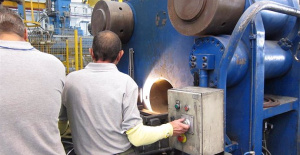 Industrial inflation deepens its fall in March to 8.2% and accumulates 13 months of declines
Industrial inflation deepens its fall in March to 8.2% and accumulates 13 months of declines How Blockchain in being used to shape the future
How Blockchain in being used to shape the future Not just BTC and ETH: Here Are Some More Interesting Coins Worth Focusing on
Not just BTC and ETH: Here Are Some More Interesting Coins Worth Focusing on Retrópolis brings the golden age of video games and computing to the UPV
Retrópolis brings the golden age of video games and computing to the UPV Looking for video games that value the neighborhoods of Valencia
Looking for video games that value the neighborhoods of Valencia UPV researchers improve the efficiency of air conditioning systems using a geothermal heat pump
UPV researchers improve the efficiency of air conditioning systems using a geothermal heat pump València is committed to citiverse and smart tourism to be "the reference technological hub of the Mediterranean"
València is committed to citiverse and smart tourism to be "the reference technological hub of the Mediterranean" A million people demonstrate in France against Macron's pension reform
A million people demonstrate in France against Macron's pension reform Russia launches several missiles against "critical infrastructure" in the city of Zaporizhia
Russia launches several missiles against "critical infrastructure" in the city of Zaporizhia A "procession" remembers the dead of the Calabria shipwreck as bodies continue to wash up on the shore
A "procession" remembers the dead of the Calabria shipwreck as bodies continue to wash up on the shore Prison sentences handed down for three prominent Hong Kong pro-democracy activists
Prison sentences handed down for three prominent Hong Kong pro-democracy activists ETH continues to leave trading platforms, Ethereum balance on exchanges lowest in 3 years
ETH continues to leave trading platforms, Ethereum balance on exchanges lowest in 3 years Investors invest $450 million in Consensys, Ethereum incubator now valued at $7 billion
Investors invest $450 million in Consensys, Ethereum incubator now valued at $7 billion Alchemy Integrates Ethereum L2 Product Starknet to Enhance Web3 Scalability at a Price 100x Lower Than L1 Fees
Alchemy Integrates Ethereum L2 Product Starknet to Enhance Web3 Scalability at a Price 100x Lower Than L1 Fees Mining Report: Bitcoin's Electricity Consumption Declines by 25% in Q1 2022
Mining Report: Bitcoin's Electricity Consumption Declines by 25% in Q1 2022 Oil-to-Bitcoin Mining Firm Crusoe Energy Systems Raised $505 Million
Oil-to-Bitcoin Mining Firm Crusoe Energy Systems Raised $505 Million Microbt reveals the latest Bitcoin mining rigs -- Machines produce up to 126 TH/s with custom 5nm chip design
Microbt reveals the latest Bitcoin mining rigs -- Machines produce up to 126 TH/s with custom 5nm chip design Bitcoin's Mining Difficulty Hits a Lifetime High, With More Than 90% of BTC Supply Issued
Bitcoin's Mining Difficulty Hits a Lifetime High, With More Than 90% of BTC Supply Issued The Biggest Movers are Near, EOS, and RUNE during Friday's Selloff
The Biggest Movers are Near, EOS, and RUNE during Friday's Selloff Global Markets Spooked by a Hawkish Fed and Covid, Stocks and Crypto Gain After Musk Buys Twitter
Global Markets Spooked by a Hawkish Fed and Covid, Stocks and Crypto Gain After Musk Buys Twitter Bitso to offset carbon emissions from the Trading Platform's ERC20, ETH, and BTC Transactions
Bitso to offset carbon emissions from the Trading Platform's ERC20, ETH, and BTC Transactions Draftkings Announces 2022 College Hoops NFT Selection for March Madness
Draftkings Announces 2022 College Hoops NFT Selection for March Madness